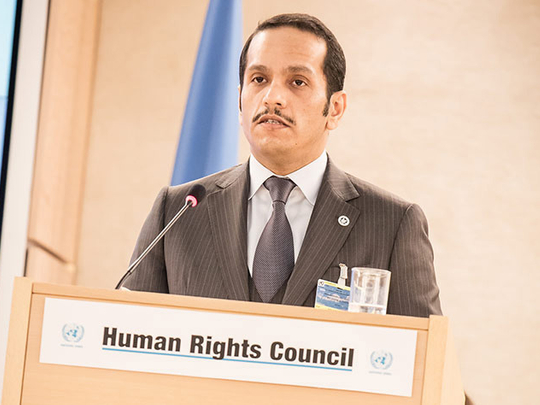
Manama: Qatar’s Foreign Minister Shaikh Mohammad Bin Abdul Rahman Al Thani said that the promotion and protection of human rights were strategic choices for his country.
In a statement to the 31st regular session of the Human Rights Council, the minister said Qatar has adopted several legislative measures related to the promotion and protection of human rights, including, amendments to the country’s labour laws and to the 2015 law regulating the entry, exit, and residence of expatriates.
These legislations have strengthened the constitutional and legal protection for the foreign workers’ rights in accordance with international standards and obligations under international conventions to which Qatar is party, the minister said.
“I wish to pay tribute to the significant role played by the expatriate workers in the development of the State of Qatar, and to stress in this regard that the State of Qatar is keen on promoting and protecting their rights and providing them with suitable work environment,” Shaikh Mohammad said, Qatar News Agency (QNA) reported.
In its efforts to enhance the institutional framework for human rights, Qatar issued Law 12 for 2015 with a view to ensuring greater independence of the National Human Rights Committee as well as to ensure its members further safeguards and guarantees in line with Paris Principles, he added.
The minister said Qatar, as part of its efforts to contribute effectively to international efforts aimed at promoting human rights and peace and security, hosted several major international conferences and events of interest to the region, including a regional conference on “UNHCR’s role in the promotion and protection Human Rights in the Arab region” in January.
Shaikh Mohammad said Qatar attached great importance to international cooperation and planned to implement programmes that would empower several developing countries to catch up with the development process as part of its efforts and enforcement of development goals.
The minister said that human rights challenges were growing all over the world despite the passing of nearly a decade since the Human Rights Council was created.
“Despite the efforts of the Human Rights Council, the situation of human rights is not better that it was upon the establishment of the council,” he said, adding that occupation, tyranny and racial discrimination remained sources of human rights violations.
Shaikh Mohammad referred to his speech before the council last year in which he warned that “if tackling human rights violations is not effective and firm enough, the world will witness more violence, extremism and conflicts.”
He said the continuing Israeli occupation of Arab territories was a stain of shame for humanity as Israel continues its illegal policies, arbitrary arrests, the siege of the Gaza Strip since 2007, the expansion of settlements, repeated and systematic attacks on Al Aqsa Mosque, the destruction of schools, and the inappropriate treatment of prisoners and detainees.
The Israeli policies constitute flagrant challenge to the will of the international community and violate the international humanitarian law, particularly the Fourth Geneva Convention, he said.
Shaikh Mohammad said civilians were usually the victims of wars and violent conflicts, expressing sorrow over the death of more than 300,000 Syrians, mostly women, children and elders, and the displacement of over 12 million people internally and abroad at the hands of a regime that exceeded all red lines.
Failing to punish the culprits of these crimes makes the international community lose its credibility in establishing criminal justice and raises doubts about the effectiveness of the protection of civilians and the preservation of human rights, the minister said.
He stressed the necessity of reaching a peaceful settlement that achieves the legitimate ambitions of the Syrian people according to Geneva I and the establishment of a transitional government with absolute executive powers.











